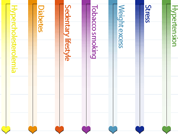In order to enhance recovery after a heart attack or unstable angina, and to prevent recurrence, various drug products, all of which have been scientifically proven to be useful, are prescribed.
These drugs have been studied in tens of thousands of patients and have been well tolerated in the vast majority of cases. There are 4 main drug groups:
Platelet anti-aggregators
They «fluidify» the blood and, in doing so, reduce the risk of clot formation. The main drug in this class is aspirin. Often, particularly after stent implantation, a second drug in this class must be taken
ATTENTION: stopping aspirin or the second drug can lead to a new heart attack, as the stent can re-occlude. One must therefore never stop taking this medication without prior approval from your physician or cardiologist. The main side effect of this medication is bleeding, which is rarely serious.
Beta blockers
They slow the heart rate, decrease blood pressure and reduce the heart's workload. They have side effects which are often temporary, such as: headaches, fatigue, dizziness, gastro-intestinal problems, decreased libido, even impotence. There are several drugs in this class and one that is better tolerated can therefore be prescribed.
Angiotensin Converting Enzyme Inhibitors (ACEI)
They dilate the arteries, decrease blood pressure and prevent progressive enlargement of the heart. They also decrease the risk of heart attack recurrence. Their main side effect is coughing. In these instances, we can propose another class of medication with similar effects. On beginning this type of medication, there may be dizziness, low blood pressure or decreased kidney function. All these aspects are closely monitored.
Statins
They stabilize and can make atherosclerosis plaques regress, and decrease cholesterol levels, all of which leads to a decreased risk of a cardiac event recurrence. They are generally well tolerated, but can cause muscle pain. If this is the case, speak with your physician/cardiologist.
Never stop medication without prior consent from your physician or cardiologist. If a treatment is poorly tolerated, inform your physician or cardiologist immediately.
